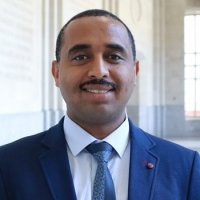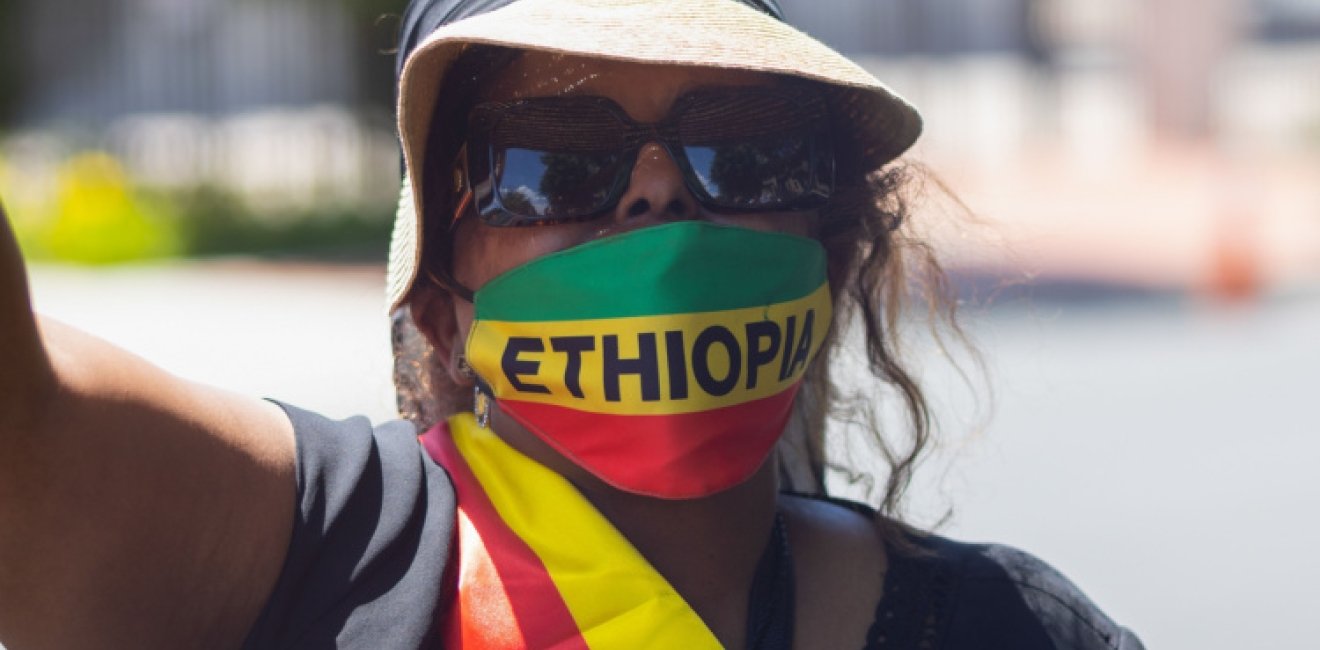
A blog of the Africa Program
Studies document that origin country contexts marked by ethnic division and instability tend to produce diaspora communities entangled in similar circumstances. Such is the case of the Ethiopian diaspora based in the United States, the second-largest African diaspora group after Nigeria. It is estimated that there are 3 million Ethiopian diaspora worldwide, with the United States hosting nearly 10% of the total. Their arrivals in the United States were clustered in successive waves of migration dating back to the 1950s. Since the late 1980s, however, the Ethiopian diaspora population has increased steadily due to recurrent political and security deficits. For instance, approximately 10,000 Ethiopian migrants resided in the United States in 1980; however, by the late 1980s, excluding political exiles, the number of Ethiopians settled in the country surpassed 25,000. According to the US Census, the total estimate of the Ethiopian diaspora in the United States has reached over 340,000.
Despite their differences in ethnic lineage, religion, migration path, and profession, US-based Ethiopian diaspora members share concerns about the current security crisis in their homeland. For some, the matter is personal and pressing, with family members and relatives directly involved in or affected by internal conflicts in Ethiopia. For others, their concern is driven by the self-inflicted burden of voicing political interests and insecurities of their ethnic group or that of all Ethiopians. This latter group’s attachment to the homeland is not restricted to social and emotional ties; they are also immersed in its political and security underpinnings. However, despite the plea from the Ethiopian National Dialogue Commission (ENDC) and piling expectations of the US government for their constructive engagements, their contribution to peacebuilding efforts has underwhelmed. Instead, they are often portrayed as conflict promoters.
Following the first Ethiopian Diaspora Peace Conference held on July 21-22, 2023, in San Diego, there is growing optimism that the US-based Ethiopian diaspora is poised to contribute significantly to the ongoing peace-building efforts in Ethiopia. The conference that saw the participation of Ambassador Mike Hammer, US Special Envoy for the Horn of Africa, and Congresswoman Sara Jacobs, the Ranking Member of the House Foreign Affairs Subcommittee on Africa, has brought together representatives of the American Ethiopian Public Affairs Committee (AEPAC), and ethnically based diaspora organizations from Amhara, Oromo, Somali, and Tigray communities. Despite the early concerns raised by the Amhara community representative who eventually walked out from the event, the conference marked the beginning of a new chapter towards a pro-peace engagement of the US-based Ethiopian diaspora community.
The Bottlenecks
Contrary to the ongoing effort to foster the peacebuilding role of the diaspora, ever-lingering political and ethnic divisions and mistrust among the Ethiopian diaspora continue to hamper their contributions to peacebuilding. These divisions largely mirror the current political divisions and landscape in Ethiopia. Political fragmentation among the diaspora is linked with their competing political aspirations regarding ethnic politics and the transition to a democratic order. In contrast, inter-ethnic tensions and volatile security conditions within Ethiopia are fueling ever-deepening ethnic rifts. As a result, the social fabric and cohesion of the Ethiopian diaspora are gradually weakening. Due to the growing fragmentation, the diaspora community has been unable to voice unified messages to the host government and other key actors, let alone play a meaningful role in peacebuilding.
Second, the deleterious online engagements (including disseminating hate speech and fake news/disinformation, warmongering, and promoting ethnic cleansing and genocide) of certain segments of the Ethiopian diaspora undermines the credibility of the broader diaspora community. Third, a deteriorating relationship between the diaspora and the Ethiopian government hinders genuine peacebuilding collaboration. Fourth, the scarcity of financial resources to fund multi-site peacebuilding processes remains another significant challenge. Fifth, the absence of an umbrella organization aggregating the concerns of more than 400 registered Ethiopian diaspora organizations in the US hinders collective peacebuilding efforts.
Addressing ethnic division will take time, yet diaspora and religious organizations must mobilize together to establish umbrella structures that unite their fragmented clusters.
Peacebuilding Assets of the Ethiopian Diaspora
Given the socio-economic and political capital at their disposal, the diaspora is uniquely positioned to contribute to ongoing peacebuilding efforts. First, their pecuniary power—manifested in an investment—empowers them to compel the government and other leaders to accept peace proposals (annually, the Ethiopian diaspora generated an average of $4 billion in remittances). Second, their access to institutions and officials of the host governmentprovides them with leverage to exert pressure on the homeland leadership within the government and other parties involved in the conflict. Third, their social ties within Ethiopia’s local communities enable them to comprehend the sub-structures that underlie ongoing conflicts and facilitate easy penetration into the social fabric of local communities. Fourth, their exposure to stable and democratic political space equips them with the appetite and necessary skills to promote peace as a significant political remittance.
To be recognized and serve as a vital stakeholder in the peacebuilding process, Ethiopia’s diaspora must build on the experiences of other diaspora groups with commendable peacebuilding track records. As observed in the case of the US-based Irish diaspora, establishing umbrella organizations helps to effectively lobby the host government to facilitate the peace process that led to the signing of the 1998 Good Friday Agreement. The experience of the Sri Lankan Tamil diaspora shows that the diaspora communities positively influence belligerent parties to commit tocease-fire agreements. Between 2013-2018, the South Sudan diaspora in Australia played a central role in supporting peacebuilding processes by training peace mobilizers, pressuring political leaders to engage in negotiations, and using its social influence to shape the mindsets of local communities. Similarly, Somali diasporas in Denmark are supporting peacebuilding in Somalia through collaboration with local NGOs in promoting a culture of peace and rehabilitation of al-Shabab defectors.
The Way Forward
Unleashing the peacebuilding contribution of the Ethiopian diaspora requires bridging the rifts among the sub-groupings, addressing the financial deficiencies of diaspora organizations, and defusing the deleterious online engagements of the diaspora. Addressing ethnic division will take time, yet diaspora and religious organizations must mobilize together to establish umbrella structures that unite their fragmented clusters. These structures should prioritize fostering trust, understanding, and inter-ethnic harmony among the polarized Ethiopian diaspora. Together, they must develop codes of engagement and roadmaps to support peacebuilding processes.
The US government should consider introducing initiatives that incentivize and support the peacebuilding efforts of Ethiopian diaspora organizations. Specifically, the recently established President's Advisory Council on African Diaspora Engagement (PAC-ADE) should take the lead in facilitating the introduction of tailored programs that enhance the peacebuilding role of the Ethiopian diaspora. The Council should also play a key role in fostering dialogue between the various sub-groupings of the US-based Ethiopian diaspora.
To sum up, the US-based Ethiopian diaspora must learn that antagonistic and fragmented efforts to shape the policy orientation of the US government towards the current security crisis in Ethiopia will not yield positive results. Therefore, they need to work towards finding common ground by establishing an umbrella organization and engaging in inter-ethnic dialogue. These endeavors could serve as a foundation for collective peacebuilding engagements, thereby augmenting their contribution to the ongoing efforts of the US government and other regional actors to bring lasting peace to Ethiopia.
Adane Tadesse is a Ph.D. candidate in Political Science at Addis Ababa University in Ethiopia. Since 2012, he has been a lecturer and researcher in Political Science at Debre Markos University and Addis Ababa University. His research interests include peacebuilding, political settlement, foreign policy, governance, and African environmental politics. Mr. Adane was a Southern Voices Network for Peacebuilding Scholar for the Fall 2023 term in Washington, DC.
The opinions expressed on this blog are solely those of the authors. They do not reflect the views of the Wilson Center or those of Carnegie Corporation of New York. The Wilson Center's Africa Program provides a safe space for various perspectives to be shared and discussed on critical issues of importance to both Africa and the United States.
Author

PhD Candidate and Lecturer, Department of Political Science and International Relations, Addis Ababa University, Ethiopia

Africa Program
The Africa Program works to address the most critical issues facing Africa and US-Africa relations, build mutually beneficial US-Africa relations, and enhance knowledge and understanding about Africa in the United States. The Program achieves its mission through in-depth research and analyses, public discussion, working groups, and briefings that bring together policymakers, practitioners, and subject matter experts to analyze and offer practical options for tackling key challenges in Africa and in US-Africa relations. Read more

Explore More in Africa Up Close
Browse Africa Up Close
The Innovative Landscape of African Sovereign Wealth Funds



